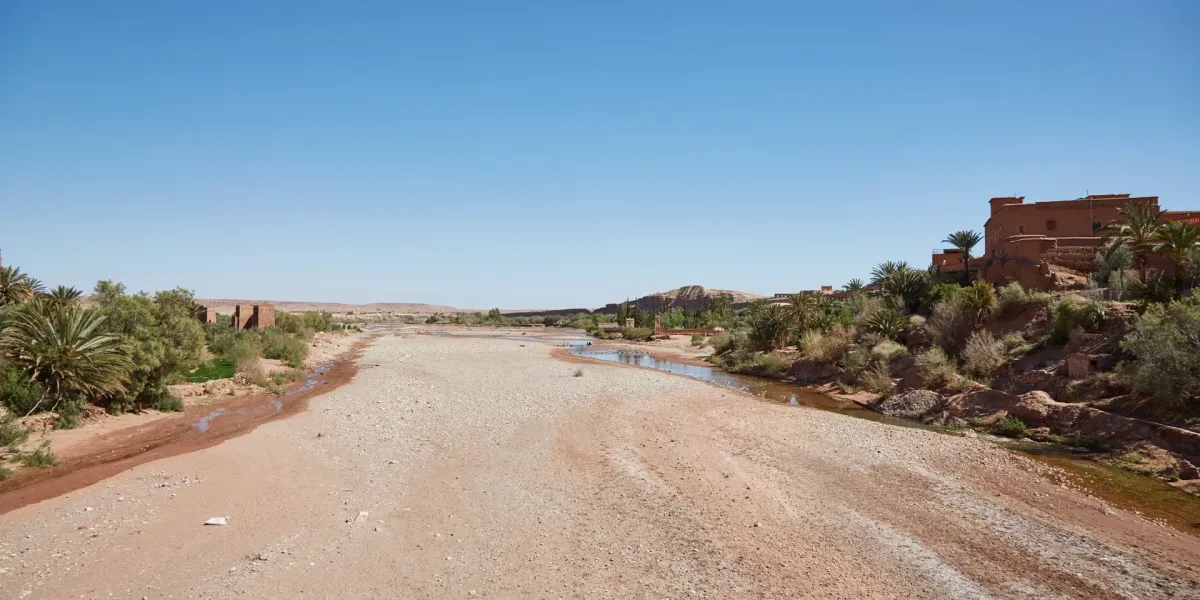
THE BACKGROUND
Morocco is highly vulnerable to climate change and is prone to water scarcity, declining agricultural production, desertification, flooding, and rising sea levels. By 2050, the country expects an increase in average temperatures estimated between 1 and 1.5°C, rainfall reduction of 10% to 30% depending on the areas, rising sea levels and acceleration of extreme events (particularly droughts and floods). Some sectors are seen as priority ones. For instance, the confrontation between water resources mobilised and the water demand for agriculture and agri-business is alarming. Over the medium term, several studies projected that current water consumption habits, coupled with the effects of climate change, could contribute to a loss of 80% of all water resources in Morocco by 2045 (Thomas Hill, US Institute of Peace, June 2022). Whilst mitigation business models can be measured through the quantifiable metrics “CO2 emissions per tonne reduced”, adaptation solutions take different forms and shapes. An increased level of financing is therefore required to assess climate risks and mobilize adequate funding in the most vulnerable sectors of the economy.
Against this background, companies and financial institutions in Morocco are facing increasing pressure to report climate risks and opportunities as well as other environmental, social, and governance (ESG) matters driven by shareholder pressure, debt providers, regulation, reputational concerns and other factors. Furthermore, companies are expected to integrate the recommendations of the Task Force on Climate-related Financial Disclosures (TCFD) that aim to increase the level of meaningful, decision-useful reporting on climate-related risks and opportunities. Identification, management and disclosure of climate-related risks, as well as the development of forward-looking strategies, is now becoming part of the prudent business decision-making process.
Reflecting this clear need, Bank Al-Maghrib (BAM) issued a directive n°5/W/21 in March 2021 on the financial risk management mechanism related to climate change and the environment, intended for credit institutions and related entities, “CIRE”. The goals of the Directive are to encourage the sector to address and manage financial risks related to climate change and the environment and to spur new commitments from CIRE towards sustainable finance. The Directive sets a framework to help financial institutions identify the potential sources of climate change-related and environmental risks and ensure their measurement, management, monitoring, and control.
In May 2022, BAM, Groupement Professionel des Banques du Maroc (GPBM), and the EBRD signed a Memorandum of Understanding (MoU) to support climate and environmental risk management in Morocco’s financial sector. Our consulting assignment was the first concrete step in implementing this MoU.
THE PROJECT
The key objective of our assignment was to support BAM in raising awareness and building capacity in the Moroccan financial sector about climate and environmental risk management, disclosures and promotion of green investments. Financial regulators have a decisive role in protecting market actors and investors from climate risks by creating the conditions for disclosure and promoting the development of sustainable investment practices. It is also crucial that regulators engage with stakeholders to elaborate on disclosure guidelines and tools, to enhance consistency and comparability.
THE RESULTS
In the first stage, the consulting team surveyed current climate-related practices in the financial sector and prepared a high-level conference on climate risks in Morocco. Eventually, advisory support was provided to establish a road map for aligning the Moroccan financial sector with a low-carbon pathway.
Location: Morocco
Solution: Climate Risk Management
Tool(s) mobilized: Strategic advising, market assessment, sector deep dive, climate risk survey; high-level conference
Share on :